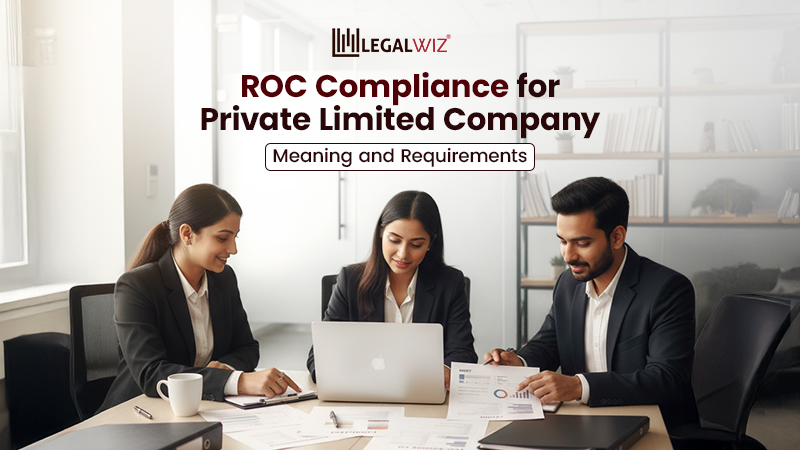ROC Compliance for Private Limited Company: Meaning and Requirements
Every private limited company in India must follow specific compliance requirements set by the Ministry of Corporate Affairs with the Registrar of Companies (ROC). These compliances keep company records accurate, maintain legal status and prevent penalties for delays.
Many founders know that annual compliance for a company is mandatory, yet often struggle with what needs to be filed and when. Understanding these essentials strengthens the organisation and builds confidence among banks and investors.
This blog outlines the key ROC compliance calendar for private limited companies and the timelines to follow for 2026.
What ROC Compliance Means for a Private Limited Company
ROC compliance refers to the set of filings and disclosures that every private limited company must submit to the Registrar of Companies. The ROC functions as the central records authority for all registered companies in India. Its role is to maintain an accurate public record of a company’s financial position, governance decisions and statutory changes.
Role of the Registrar of Companies
- The ROC maintains the official record of all companies registered in India
- It monitors whether companies operate within the framework of the Companies Act
- It ensures that statutory data such as shareholding, financial statements and governance details remain updated
How ROC Filings Keep a Company Legally Active
- Timely filings confirm that the company is carrying on business
- Updated records help maintain the company’s legal status and credibility
- Non-filing may lead to penalties, additional fees or removal from the register
- Banks, investors and government departments rely on ROC records for verification
General ROC Compliance vs Annual ROC Compliance
| Type of Compliance | Meaning | Examples |
| General ROC Compliance | Routine filings triggered by specific events or changes in the company | Change in directors, change in share capital, auditor appointment |
| Annual ROC Compliance | Mandatory annual compliance filings are required for every private limited company | AOC-4, MGT-7, ADT-1 |
MCA’s Regulatory Framework
- All ROC filings are governed by the Companies Act, 2013 and MCA rules
- The MCA portal provides the forms, due dates and disclosure requirements
- Digital filings ensure transparency, accountability and uniform reporting
Mandatory ROC Compliance for Private Limited Companies
A private limited company must meet a fixed set of legal duties each year to remain active on MCA records. These obligations help maintain transparency, protect stakeholders, and keep the company in good standing.
A concise overview of the basic criteria any organization must follow:
Board meetings: Major decisions and corporate growth need regular board meetings. These meetings record and legalize director strategy, finances, and operations conversations.
Annual General Meeting: All private limited companies must have an AGM yearly. Shareholders and directors review financial statements, performance, and important issues. AGMs provide transparency and shareholder information.
Statement of Interest: Directors must disclose decision-affecting personal interests. There may be business or transaction conflicts. Disclosures guarantee fairness, reduce risks, and fulfill the director’s job to serve the business.
Annual Income Tax Returns: Businesses must submit annual income tax returns. Financial, shareholder, and management change statements must be filed yearly with the Registrar of Companies. Filings update public records and prove compliance.
Statutory Registers: Every private limited business must have a register of members, directors, key managers, and charges. These documents underpin business paperwork and are necessary for audits, inspections, and due diligence.
Director ID and KYC: Every director needs a DIN. Annually, they must file Form DIR-3 KYC to update their ROC personal information. Failure to register KYC results in an inactive DIN and a ₹5,000 penalty for late submission.
Start of Business: Businesses established after the announced date must submit a declaration of beginning. This is done once to indicate that the business has begun operations and received shareholder funding.
ROC Compliance for New Private Limited Companies
Newly incorporated private limited companies have a few early compliance steps that must be completed within the first few months of registration. These ensure the company becomes fully operational and remains legally recognised by the MCA.
Key first-year ROC compliances include:
- INC-20A (Commencement of Business): Must be filed within 180 days of incorporation after the initial capital is deposited. Confirms that the company has started its operations.
- Appointment of First Auditor: The board must appoint the first auditor within 30 days of incorporation. If the board fails, shareholders must appoint one within 90 days. For this, filing Form ADT-1 is essential. Learn more about Form ADT-1 to understand its purpose and requirements. Read the full blog here: Form ADT-1 for Appointment of Auditor: Due Date, Filing & Late Fees
- First Board Meeting: Should be held within 30 days of incorporation. The company should record minutes and discuss basic organisational matters.
- Opening Statutory Registers: Registers of members, directors, and shares must be created and maintained from the start.
- Issue of Share Certificates: Share certificates should be issued to subscribers within 60 days of incorporation.
These steps set the foundation for smooth annual compliance filing for a company in later years.
Event-Based Compliance for Private Limited Company
Event-based compliances arise when specific corporate actions take place during the year. These filings must be completed within defined timelines to ensure the company’s records remain accurate and legally valid.
Change in Directors
- Form Required: DIR-12
- When Triggered: Appointment, resignation, or change in designation
- Purpose: Update the ROC with the latest board composition
Change in Registered Office
- Form Required: INC-22
- When Triggered: Any change in the company’s registered office needs you to file INC-22A
- Purpose: Maintain accurate correspondence details with the MCA
Change in Authorized Share Capital
- Form Required: SH-7
- When Triggered: Increase or decrease in authorised share capital
- Purpose: Reflect updated capital structure in official records
Allotment or Return of Allotment of Shares
- Form Required: PAS-3
- When Triggered: Issuance or allotment of new shares
- Purpose: Record details of allottees and share issuance with the ROC
Transfer of Shares
- Form Required: SH-4 (where applicable based on change in capital)
- When Triggered: Transfer of shares between members
- Purpose: Update ROC with changes affecting share capital or structure
Creation or Modification of Charge
- Form Required: CHG-1
- When Triggered: When the company creates or alters a charge on its assets
- Purpose: Ensure lenders’ rights and charges are recorded and traceable
Satisfaction of Charge
- Form Required: CHG-4
- When Triggered: When a loan or secured liability is fully repaid
- Purpose: Update ROC records to reflect that the charge no longer exists
ROC Compliance Calendar for Private Limited Companies for 2026
ROC compliance for private limited companies involves several filings that must be completed whenever a change or corporate action takes place. The compliance calendar for Pvt Ltd companies below summarises the key forms, their purpose and the typical due dates.
| Compliance | Form | Purpose | Due Date |
| Incorporation of Private Limited Company | DIR-12 | Reporting the appointment of a new director | Within 30 days of appointment |
| Change in Directors | DIR-12 | Reporting resignation or change in a director | Within 30 days of change |
| Change in Registered Office | INC-22 | Reporting change in the company’s registered office | Within 30 days of change |
| Increase in Authorised Share Capital | SH-7 | Reporting increase in authorised share capital | Within 30 days of passing the resolution |
| Decrease in Authorised Share Capital | SH-7 | Reporting decrease in authorised share capital | Within 30 days of passing the resolution |
| Allotment of Shares | PAS-3 | Reporting allotment of new shares | Within 30 days of allotment |
| Return of Allotment | PAS-3 | Reporting return of allotment details | Within 30 days of allotment |
| Transfer of Shares | SH-4 | Reporting transfer of shares | Within 60 days of transfer |
| Creation of Charge | CHG-1 | Reporting creation of a charge on company assets | Within 30 days of creation |
| Modification of Charge | CHG-1 | Reporting modification of an existing charge | Within 30 days of modification |
| Satisfaction of Charge | CHG-4 | Reporting full repayment or satisfaction of charge | Within 30 days of satisfaction |
| Annual Return | AOC-4 & MGT-7 | Filing the company’s annual return | Within 30 days (AOC-4) and 60 days (MGT-7) from the end of financial year |
| Income Tax Return | ITR | Filing return of income with the Income Tax Department | As per Income Tax Act |
| GST Returns | GSTR | Filing GST returns | As per GST Act |
| Audit Report | Audited Financial Statements | Filing the audited financial statements | Within 30 days of AGM |
| Statement of Account | Statement of Account | Submission of company’s financial statement | Within 30 days of AGM |
| Director KYC | DIR-3 KYC | Annual KYC for directors holding a valid DIN | Before the due date of annual return |
Conclusion
Compliance with ROC standards is a regulatory necessity and crucial to the long-term survival of your private limited business. On-time filings and careful recordkeeping strengthen the firm. It becomes simpler to obtain financing, gain stakeholder confidence, and avoid growth-slowing penalties. Many compliance chores are commonplace, yet they underpin effective governance.
Managing daily operations may make keeping track of deadlines difficult for founders and directors. Structured approach and competent advice help here. LegalWiz.in handles filings, organizes papers, and accurately tracks due dates to make firms legal year-round. Compliance becomes part of a company’s seamless and healthy operation with the correct help.
Staying organized and following the compliance roadmap keeps your firm active, reputable, and ready to expand.
Frequently Asked Questions
What is ROC compliance for a private limited company?
ROC compliance refers to the set of filings, disclosures and records that every private limited company must submit to the Registrar of Companies each year. These filings keep the company legally active and ensure transparency in its operations.
What happens if a company misses an ROC filing deadline?
Late filings attract additional fees, and continued non-compliance can lead to penalties, director disqualification or the company being marked as inactive.
Do new private limited companies have different ROC requirements?
Newly incorporated companies have a few extra steps, such as filing INC-20A, appointing the first auditor and holding the first board meeting within statutory timelines.
Can ROC compliance be managed without professional help?
While basic tasks can be handled internally, many companies prefer working with experts such as LegalWiz.in to ensure accuracy, avoid penalties and stay ahead of due dates.

Sapna Mane
Sapna Mane is a skilled content writer at LegalWiz.in with years of cross-industry experience and a flair for turning legal, tax, and compliance chaos into clear, scroll-stopping content. She makes sense of India’s ever-changing rules—so you don’t have to Google everything twice.







